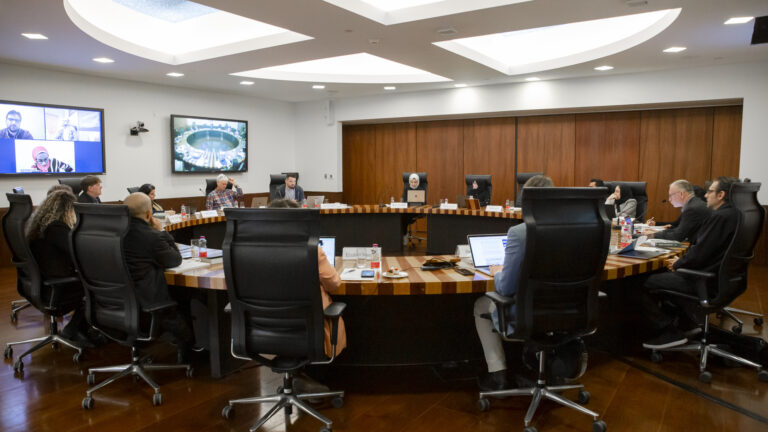Focused Discussions, Regional Studies
POMEPS-CIRS Politics of Sports in the Middle East Workshop

On January 14 and 15, 2023, the Center for International and Regional Studies (CIRS) at Georgetown University in Qatar, in collaboration with the Project on Middle East Politics (POMEPS) convened a two-day closed-door workshop to explore and study the complex relationship between politics and sports in the Middle East. During the meeting invited regional and international scholars presented short papers and received feedback from the group. Some of the themes under discussion included football and national identity, sports washing, political mobilizations, gender and sports, global capital, and stadium dynamics, among others.
Over the two days, the convened scholars discussed various converging themes and topics associated with the political dynamics of football performance, spectatorship, sponsorships, and hosting of events. Starting the discussion with the rise of disinformation and the use of bots in digital technology and social media for purposes of propaganda, it was debated that football, with its global and often emotional fanbase, worldwide popularity, and capital-heavy investment opportunities, is also a key area for competing narratives. News shared on social media around sporting events has become another avenue for the regional rivalry of gulf regimes and the construction of reputations in the international arena. The participants also discussed and questioned the myriad reasons behind the gulf states’ heavy sports investments. It was stated that prestige building, sports washing, and projection of soft power were the main factors of this investment strategy. The role of football in national identity preservation in the Arab world and the politicization of the sport in countries such as Morocco, Egypt, and Palestine were also examined and discussed.
Ultras have a history of using football to develop new tools of political mobilization. This is particularly true for Cairo ultras who were active in mobilizing against the Mubarak regime. The participants explored the connection between aesthetics and politics by looking at Egypt’s football ultras movements. The discussion was then shifted to the role of privatization of football clubs in Egypt and the lack of investors’ interest in the Egyptian football industry. It was argued that structural problems in the Egyptian economy were the main reason behind the lack of investors and availability of funding for football clubs.
The use of football to construct and contest national identity in Palestine and Iran was also a topic of discussion at the meeting. In the first case, it has been utilized to shape and represent the national identity by the Palestinians, whereas in the latter it is the tool through which non-Persian-speaking minorities express their Azeri nationalistic narrative in Iran. Continuing the debate on Iran the group next looked at how various spaces have been used by certain political actors to bypass the ban on women’s entry to football stadiums in Iran. One such arena has been the movie theaters that allow female spectators to the screenings of football matches. Shifting the focus to Turkey, it was maintained that football has been used by authoritarian regimes to build political support. This in turn has paved the way for the politicization of the football industry in Turkey and the mobilization of football fans to publicly express their dissent against these regimes. The discussion was brought to a close by exploring how Islamist movements in the Middle East namely, Saudi Arabia, Iran, the Muslim Brotherhood, and Hezbollah, deal with football. It was stated that in order to avoid alienating the region’s youth a profound cultural adjustment process has been initiated in many countries apart from Iran.
The organizers thanked the participants for their contribution to the robust and productive discussions. Participants will make revisions to their papers based on the feedback received. The collection will be co-edited by POMEPS and CIRS and jointly published in POMEPS Studies Journal in the near future.
- To view the working group agenda, click here
- To read the participants’ biographies, click here
Participants and Discussants:
- Majd Abuamer, Arab Center for Research and Policy Studies
- Abdullah Al-Arian, Georgetown University Qatar
- Zahra Babar, CIRS – Georgetown University Qatar
- Misba Bhatti, CIRS – Georgetown University Qatar
- Ronnie Close, American University in Cairo.
- Eman Demerdash, Ph.D. candidate Cairo University
- Saleh Elghamrawi, American University of Cairo.
- Sami Hermez, Northwestern University in Qatar
- Marc Owen Jones, Hamad bin Khalifa University in Doha, Qatar
- Ehsan Kashfi, University of Alberta
- Marc Lynch, The George Washington University
- Yara Nassar, Arab Center for Research and Policy Studies
- Suzi Mirgani, CIRS – Georgetown University Qatar
- Ibrahim S.I. Rabaia, Palestinian Research Center
- Danyel Reiche, Georgetown University Qatar
- Curtis Ryan, Appalachian State University- North Carolina
- Sefa Secen, Ohio State University.
- Nazanin Shahrokni, London School of Economics
- Dag Tuastad, University of Oslo.
- Elizabeth Wanucha, CIRS – Georgetown University Qatar
Article by Misba Bhatti, Research Analyst at CIRS